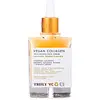What's inside
What's inside
 Key Ingredients
Key Ingredients

 Benefits
Benefits

 Concerns
Concerns

 Ingredients Side-by-side
Ingredients Side-by-side

Water
Skin ConditioningSqualane
EmollientTriolein
Skin ConditioningGlycerin
HumectantGlyceryl Oleate Citrate
EmulsifyingTranexamic Acid
AstringentCaprylic/Capric Triglyceride
MaskingMagnesium Aluminum Silicate
AbsorbentPhenoxyethanol
PreservativeXanthan Gum
EmulsifyingBenzyl Alcohol
PerfumingPhospholipids
Skin ConditioningRetinol
Skin ConditioningSodium Gluconate
Skin ConditioningSodium Citrate
BufferingCitric Acid
BufferingEthylhexylglycerin
Skin ConditioningCystoseira Tamariscifolia Extract
Skin ConditioningTocopherol
AntioxidantWater, Squalane, Triolein, Glycerin, Glyceryl Oleate Citrate, Tranexamic Acid, Caprylic/Capric Triglyceride, Magnesium Aluminum Silicate, Phenoxyethanol, Xanthan Gum, Benzyl Alcohol, Phospholipids, Retinol, Sodium Gluconate, Sodium Citrate, Citric Acid, Ethylhexylglycerin, Cystoseira Tamariscifolia Extract, Tocopherol
Aloe Barbadensis Leaf Juice
Skin ConditioningWater
Skin ConditioningCaprylic/Capric Triglyceride
MaskingPhenoxyethanol
PreservativeGlycerin
HumectantHamamelis Virginiana Water
AstringentPhospholipids
Skin ConditioningRetinol
Skin ConditioningCollagen
MoisturisingMelia Azadirachta Leaf Extract
Skin ConditioningMelia Azadirachta Flower Extract
Skin ConditioningCurcuma Longa Root Extract
MaskingOcimum Sanctum Leaf Extract
Skin ConditioningOcimum Basilicum Flower/Leaf Extract
TonicCorallina Officinalis Extract
Skin ConditioningAscorbic Acid
AntioxidantAlcohol
AntimicrobialCarbomer
Emulsion StabilisingTriethanolamine
BufferingTetrasodium Glutamate Diacetate
Aloe Barbadensis Leaf Juice, Water, Caprylic/Capric Triglyceride, Phenoxyethanol, Glycerin, Hamamelis Virginiana Water, Phospholipids, Retinol, Collagen, Melia Azadirachta Leaf Extract, Melia Azadirachta Flower Extract, Curcuma Longa Root Extract, Ocimum Sanctum Leaf Extract, Ocimum Basilicum Flower/Leaf Extract, Corallina Officinalis Extract, Ascorbic Acid, Alcohol, Carbomer, Triethanolamine, Tetrasodium Glutamate Diacetate
 Reviews
Reviews

Ingredients Explained
These ingredients are found in both products.
Ingredients higher up in an ingredient list are typically present in a larger amount.
This ingredient is an emollient, solvent, and texture enhancer. It is considered a skin-softener by helping the skin prevent moisture loss.
It helps thicken a product's formula and makes it easier to spread by dissolving clumping compounds.
Caprylic Triglyceride is made by combining glycerin with coconut oil, forming a clear liquid.
While there is an assumption Caprylic Triglyceride can clog pores due to it being derived from coconut oil, there is no research supporting this.
Learn more about Caprylic/Capric TriglycerideGlycerin is already naturally found in your skin. It helps moisturize and protect your skin.
A study from 2016 found glycerin to be more effective as a humectant than AHAs and hyaluronic acid.
As a humectant, it helps the skin stay hydrated by pulling moisture to your skin. The low molecular weight of glycerin allows it to pull moisture into the deeper layers of your skin.
Hydrated skin improves your skin barrier; Your skin barrier helps protect against irritants and bacteria.
Glycerin has also been found to have antimicrobial and antiviral properties. Due to these properties, glycerin is often used in wound and burn treatments.
In cosmetics, glycerin is usually derived from plants such as soybean or palm. However, it can also be sourced from animals, such as tallow or animal fat.
This ingredient is organic, colorless, odorless, and non-toxic.
Glycerin is the name for this ingredient in American English. British English uses Glycerol/Glycerine.
Learn more about GlycerinPhenoxyethanol is a preservative that has germicide, antimicrobial, and aromatic properties. Studies show that phenoxyethanol can prevent microbial growth. By itself, it has a scent that is similar to that of a rose.
It's often used in formulations along with Caprylyl Glycol to preserve the shelf life of products.
Phospholipids are naturally found in our skin as they are the main component of cell membranes. Phospholipids have humectant, emollient, antioxidant properties.
Phospholipids are complex lipids that contain glycerin, two fatty acids, and a phosphate group. Some foods that contain phospholipids include soybeans and milk. The phospholipids found in soy come from Lecithin. This ingredient can also be synthetically created.
Due to their hygroscopic nature, they act as both humectants and emollients. Humectants draw moisture from the air to your skin, while emollients help trap moisture in.
The phospholipids in our skin can be naturally depleted. Replenishing the phospholipids in our skin can help hydrate your skin.
Studies show phospholipids display antioxidant activity and may help with reducing the signs of aging.
This ingredient is non-occlusive.
Some types of phospholipids:
Learn more about PhospholipidsRetinol is a gold-standard ingredient for anti-aging. It is a form of Vitamin A and belongs to the class of retinoids that also includes tretinoin.
Why is retinol famous?
It has the most scientific studies backing up its skin benefits out of all the non-prescription ingredients.
Retinol is proven to:
This is why retinol is effective at removing wrinkles, fading dark spots, treating acne, and reducing the appearance of pores.
Studies show retinol is less effective when exposed to UV. Be sure to look for appropriate packaging to keep your retinol potent (similar to Vitamin C).
Using retinol or any retinoids will increase sun-sensitivity in the first few months. Though studies show retinoids increase your skin's natural SPF with continuous use, it is best to always wear sunscreen and sun-protection.
We recommend speaking with a medical professional about using this ingredient during pregnancy.
Retinol may cause irritation in some people, so be sure to patch test. Experts recommend 'ramping up' retinol use: start using this ingredient once a week and work up to using it daily.
Read about Tretinoin
Learn more about RetinolWater. It's the most common cosmetic ingredient of all. You'll usually see it at the top of ingredient lists, meaning that it makes up the largest part of the product.
So why is it so popular? Water most often acts as a solvent - this means that it helps dissolve other ingredients into the formulation.
You'll also recognize water as that liquid we all need to stay alive. If you see this, drink a glass of water. Stay hydrated!
Learn more about Water